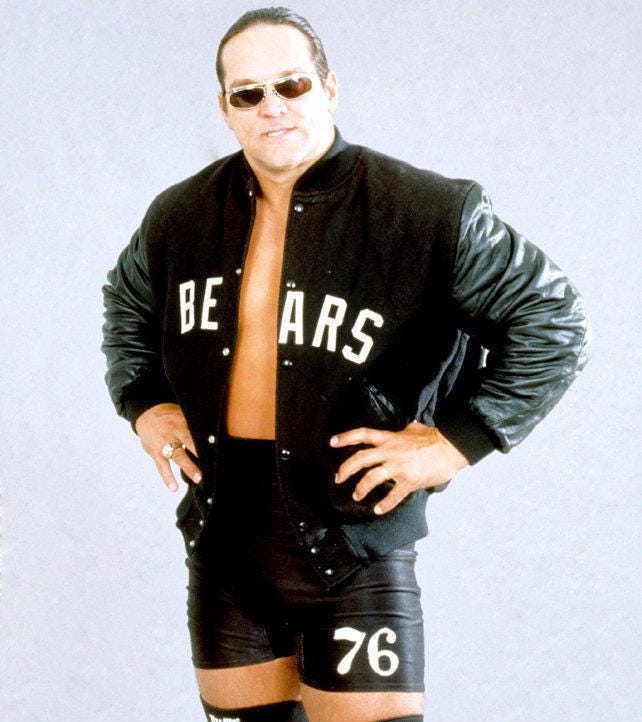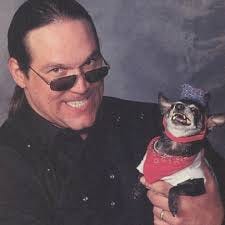Living Every Boy's Dream: A Tribute to Steve "Mongo" McMichael
An All-American at Texas, star for the Super Bowl champion Chicago Bears and a high-profile professional wrestler, Steve McMichael led an incredible life.
When Amyotrophic Lateral Sclerosis forced New York Yankees legend Lou Gehrig into retirement from Major League Baseball, the lasting impression Gehrig left on the world came in the sentence, “Today, I consider myself the luckiest man on the face of this earth.”
ALS — long referred to as Lou Gehrig’s disease, as the transcendent baseball star’s was the first highly publicized case in America — afflicts more than 30,000 people in the United States. The University of Michigan reports that every 90 minutes, someone is diagnosed with [e]very 90 minutes someone is diagnosed and passes from ALS.”
Among them was Steve “Mongo” McMichael, who died on April 23, 2025, four years after he revealed his ALS diagnosis.
I admit I struggled viewing images that were posted to social media, showing McMichael confined to a bed. I came to know McMichael as Mongo in the mid-to-late 1990s during his second act as a professional wrestler. The frail man often seen wrapped in a Chicago Bears blanket for those photos with former football teammates and ex-wrestling counterparts looked so much different from the hulking powerhouse McMichael was in his time with World Championship Wrestling.
But while the muscles and the dark hair pulled back into a sleek ponytail were gone from recent images featuring Steve McMichael, Mongo continued flashing the same magnetic smile while he battled ALS that he would flash during an interview segment on WCW Monday Nitro.
It was that electric personality that made McMichael so beloved as a Chicago Bear, evident in the public outpouring of affection sent his way upon the reveal of his ALS diagnosis. And that same charisma made his transition to wrestling natural.
Football is a common pipeline to professional wrestling for the inherent physicality of each. McMichael wrestled in an era when two of the biggest stars — Dwayne “The Rock” Johnson and “Stone Cold” Steve Austin — had college football backgrounds at Miami and North Texas. In more recent years, John Cena and Roman Reigns transitioned to the mat from college football careers at Springfield College and Georgia Tech.
The 1979 edition of the Red River Rivalry pit Mongo’s Texas Longhorns against an Oklahoma Sooners team that included “Dr. Death” Steve Williams on its roster. Williams was a two-sport star at OU — football and wrestler — and became one of the most successful American wrestlers ever in Japan.
Mongo’s most significant claim to wrestling fame, meanwhile, was as a member of the legendary Four Horsemen, a faction that headlined both the National Wrestling Alliance and WCW for the better part of 15 years; his spot in the stable came open in part because Miami University and Cincinnati Bengal nose guard Brian Pillman left the promotion.
Likewise, what could be considered McMichael’s most high-profile rivalry came against Georgia Bulldogs alum and brief Atlanta Falcon Bill Goldberg in late 1997/early 1998, shortly before Goldberg became WCW World Heavyweight Champion.
But even among the roster of professional wrestlers with football backgrounds, McMichael was an outlier. Wrestling often becomes an avenue for those who either never reach their NFL dream, like The Rock; or are in the league for little more than a cup of coffee, which was the case for both Pillman and Goldberg.
Mongo is, quite simply, the greatest former football player to transition to wrestling full-time since fellow Chicago Bear Bronko Nagurski.
Like Nagurski, McMichael embodied the Monsters of the Midway spirit with his hard-hitting, physical brand of football. He pass-rushed his way to four All-Pro selections and exited the NFL in 1994 with 95 career sacks.
Wrestling fans were reminded of McMichael’s presence on the defensive interior for the legendary 1985 Bears every time he took the ring, thanks to his No. 76 being stitched on his trunks.
For young wrestling fans who couldn’t follow the peak of Mongo’s playing career, his ring gear — which included a Bears letterman’s jacket — provided an initial point of reference to appreciate his gridiron exploits.
Still, wrestling is a medium founded on hyperbole. It wasn’t until I was a little older and gaining a greater interest in sports history before my time that I came to understand if anything, WCW’s presentation of Mongo McMichael’s football career undersold his excellence.
For example, I may have scoffed at the idea McMichael meant to Chicago sports fans what Lou Gehrig meant to generations of Yankees fans had the notion come from WCW broadcaster Tony Schiavone. But in following the tributes to Mongo, I see that the comparison isn’t so outlandish.
What’s more, McMichael offered up a quote that, in celebration of his life, offers some heartwarming perspective against a backdrop of tragedy akin to Gehrig’s famed farewell speech at Yankee Stadium.
It actually comes not from the years following McMichael’s diagnosis, but is the kicker in a quote a then-University of Texas standout offered the Associated Press upon earning Player of the Week honors in the Southwest Conference.
Isn’t that every little boy’s dream?
Going from a collegiate All-American to an NFL All-Pro to a championship-winning professional wrestler, Steve “Mongo” McMichael lived out several different boyhood dreams for countless kids.
He even did so while, on occasion, bringing his dog to work1 with him.
Before beginning his in-work wrestling career, Steve McMichael provided color commentator for World Championship Wrestling. He often carried his pet chihuahua, Pepe, with him on these appearances — usually decked out in various costumes.







